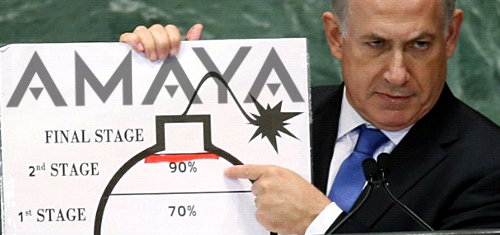The largest shareholder of UK betting operator William Hill has publicly opposed the company merging with Canadian online gambling operator Amaya Gaming, the parent company of PokerStars.
Last Friday, word broke that Hills and Amaya were considering a “merger of equals” that would create an omni-channel gambling behemoth. On Thursday, London-based Parvus Asset Management, which owns 14.3% of Hills, said it was “extremely concerned” by the merger talk.
 In an open letter to Hills’ board of directors, Parvus said the proposed tie-up was based on “limited strategic logic.” Parvus co-founders Mads Eg Gensmann and Edoardo Mercadante told the board to “stop wasting valuable time and shareholder resources pursuing this value-destroying deal,” while urging the board to pursue “all alternative options available, including a sale” of the UK bookmaker.
In an open letter to Hills’ board of directors, Parvus said the proposed tie-up was based on “limited strategic logic.” Parvus co-founders Mads Eg Gensmann and Edoardo Mercadante told the board to “stop wasting valuable time and shareholder resources pursuing this value-destroying deal,” while urging the board to pursue “all alternative options available, including a sale” of the UK bookmaker.
Gensmann later told Reuters that it “shouldn’t take more than five minutes of the board’s time to realize this deal doesn’t pass the smell test.” Parvus’ principal objections center around Amaya deriving the vast majority of its revenues from online poker, which Parvus called the financially least-attractive segment of online gambling.
Parvus expanded on its anti-poker views, saying the vertical was a “mature, if not structurally declining, revenue stream” that was dependent on a small number of highly-skilled sharps who were “inherently difficult to sell” on other, more lucrative verticals like casino. Parvus went as far as to call Amaya an “overvalued asset.”
Parvus also had more concrete objections, namely, the hefty debt load Amaya is carrying courtesy of its $4.9b deal to acquire PokerStars in 2014. Parvus notes that Hills rubbished the recent joint takeover bid by Rank Group and 888 Holdings because it would have boosted the enlarged entity’s overall debt by £2.2b, while an Amaya merger would boost net debt by £2.8b.
Parvus also expressed concern over the $870m Kentucky court judgment hanging over Amaya due to PokerStars’ dealings in the state following the 2006 passage of the Unlawful Internet Gambling Enforcement Act.
In response to the Parvus letter, a Hills spokesman told Bloomberg that “given the strategic fit, diversification and potential synergies we have a responsibility to all our shareholders to fully assess” the proposed Amaya merger.
Activist investor Jason Ader, who lobbied hard for the sale of Bwin.party digital entertainment (which went, eventually, to GVC Holdings), publicly disagreed with Parvus, tweeting that “William Hill need Amaya but I strongly support a $GVC purchase of $AYA and see significant synergy and value creation.”
Last Friday’s reports that Amaya was an acquisition target mentioned GVC as a potential bidder but the subsequent joint announcement of the Hills-Amaya talks appeared to have sidelined GVC.
PAUL TATE PLEADS GUILTY
The Parvus missive broke just as Reuters was reporting that a former PokerStars exec had pled guilty to charges related to the April 15, 2011 ‘Black Friday’ online poker indictments. Paul Tate, Stars’ former payments director, appeared in a New York District Court on Thursday to plead guilty to operating an illegal gambling business.
The 42-year-old Tate, a UK citizen, had been ‘at large’ since the Black Friday indictments. Tate told US Magistrate Judge Barbara Moses that he and his family “have paid a heavy price” for his illegal conduct. Tate faces up to five years in prison when he’s sentenced on Nov. 21.
Tate’s guilty plea leaves just PokerStars’ former owner Isai Scheinberg and Absolute Poker co-founder Scott Tom as the sole remaining members of the 11 individuals indicted on Black Friday to have yet to reach some kind of deal with the US Department of Justice.